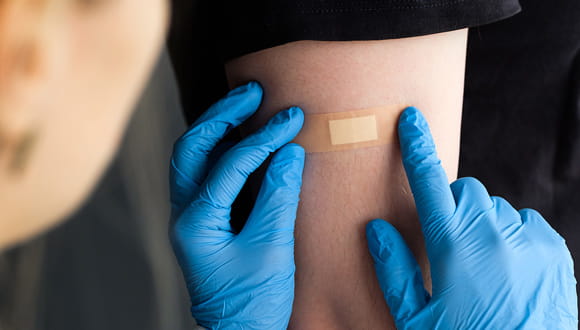How Soon Can You Get Vaccinated After Recovering From COVID-19?
Sep. 20, 2023 - Katie McCallumWith respiratory season looming and COVID-19 cases climbing, you might be wondering whether you should get the newly updated COVID-19 vaccine that’s recently become available.
"The COVID strains circulating right now are a little different than the ones covered in the last bivalent boosters," explains Dr. Long. "To reduce your risk of symptomatic infection, you should get the updated vaccine once it's available to you.”
The CDC recommends the shot for everyone 6 months and older. They also say that you’re eligible to receive it regardless of your previous COVID-19 vaccine history, meaning even if you haven’t received any prior vaccines or boosters.
“Think of it just like you would think of getting your annual flu shot,” adds Dr. Long.
But … if you’ve also had COVID-19 recently, you might also be wondering when exactly you should get vaccinated.
How soon can you get vaccinated after recovering from COVID-19?
Natural immunity provides some protection against reinfection with the virus, but vaccine-induced immunity offers even stronger protection. It’s why — even if you’ve had COVID-19 recently — you’ll want to get vaccinated eventually.
When exactly?
The CDC says you should wait at least two months since your last COVID vaccine. If you recently had a COVID infection, CDC says you may want to delay vaccination by up to three months, but also points out that you don’t need to wait that long — and some people shouldn’t.
“If you’re not sure when to get vaccinated, consult your doctor,” recommends Dr. Long. “This will likely be an individualized decision based on your health history and other personal factors, and they can help you determine the best timing for you."
How soon can you get a COVID “booster” after having COVID-19?
As COVID-19 becomes endemic, it’s time to update some of the vocabulary we became so familiar with during the height of the pandemic.
“We’re trying to get away from calling the updated shot a booster, and just call it a COVID-19 vaccine” explains Dr. Long. “Just like how we don’t call them flu boosters, we call them flu shots or flu vaccines.”
The reason? The vaccine is a different formulation this year, tailored to the COVID-19 strains currently circulating. This means we’re no longer “boosting” protection to a specific version of the virus when we get another shot. We’re updating our immune system to recognize the strains we’re most likely to encounter.
It’s why you’ll still want to receive the newly updated vaccine after recovering from COVID-19, so you can help ensure you remain protected against currently circulating variants.








